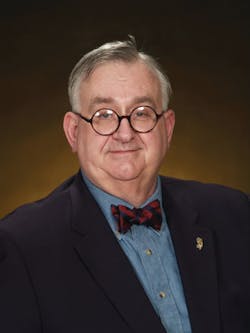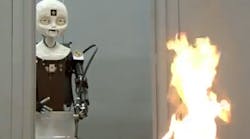The year is 2038. Many of you who are entering the fire service this year will be just about ready to pack it in and head off for a retirement home in the southwest. If I am still around, I hope to be a healthy 91-year-old guy, sitting out on my front porch enjoying a tasty cigar. With any luck you might be able to get a job as a tour guide at the Alan Brunacini Memorial Museum to Fire Service Progress. I will be too old to walk the halls any longer.
However, before we go any further, I have a question for you today that relates directly to that faraway moment in time. My question to you is simple, but critical. What type of fire department will you be leaving at that time in the future? What sorts of jobs and tasks will they be performing and how will they accomplish these tasks? What tasks do you think that you will be doing? For this visit with you I have decided to put down my books and pick up a crystal ball to see if I can divine anything from the future, based upon my nearly 50 years in the fire service.
However, before I start my trip into the future, I would like to explain my feelings about time and how it works. An understanding of my view of life will be critical to making sense out of this article. I am of the opinion that time is like one big continuum. Every tomorrow that you will ever face in your entire life, is tied directly to a very enjoyable and comfortable today. And of course every today that you will ever live is tied immediately to a very happy and nostalgic yesterday.
Think about it. Do you honestly believe that people went around complaining about what a gyp it was to live in the Dark Ages? Conversely, do you think that people went around constantly thanking their lucky stars for being able to live through the Renaissance? I don’t. I would suggest to you that the names for these ages are merely labels which were applied by historians and academicians at a later date.
So there you have it, The Harry Carter Theory of Time. What I am really trying to tell you here is that it is critical for you to get ready today. I say this because tomorrow is only a few short hours away. And do not forget the lessons of yesteryear, as they can serve as the baseline for your future-oriented GPS.
It’s my firm opinion that 25 years from now each of us will still be faced with fires to fight. Regardless of how much we believe that we can do with public education, code enforcement or fire prevention, there will still be fires. Given that human nature will still be around to make mistakes, I feel safe in saying that fires will still be a part of our problem package. But this does not have to be cast in concrete.
Let me strongly suggest that if our collective emphasis can be shifted more towards fire prevention, there may well be a lot less of them to fight. And if we can move toward residential automatic sprinklers, there will be fewer fatalities and less fire spread. But we had best get up on our horse and begin riding out to sound the call to arms.
That is what the Vision 20/20 Project is working hard to accomplish. As the president of the United States Branch of the Institution of Fire Engineers of Great Britain, one of my areas of responsibility is this vital project. We have identified areas which must be addressed and have worked to create programs to assist the fire service in reducing the incidence and severity of fire.
These are truly tomorrow-oriented matters which can be pursued today. Hit the bricks and go to work on behalf of fire safety matters.
A Look Into The Crystal Ball
What type of services will the fire department of 2038 be providing? An even more appropriate question might be, will we still be called fire departments? Here is a short list of where we could be headed:
- Interior structural firefighting operations will be a distant memory.
- Fire suppression operations on those rare occurrences when the prevention, detection, automatic suppression system experiences a failure.
- Automatic fire suppression systems of all kinds will be a common part of every community's fire defense system.
- People will refer to the days before mandatory residential fire sprinklers as the "Dark Ages."
- Fitness efforts will work to extinguish the heart attack as a cause of death within the fire service.
- The line-of-duty-death will be such a rarity that people will have to consult history books for guidance in how to conduct a funeral.
- EMS, with all of its components (BLS, ALS, defib, transport ambulance and field emergency physician), will be a daily fact of life.
- Community and fire station-based fire prevention programs (work to make every station a community service center and do not let your current mindset limit your thoughts of how to help the community). The days of hiding in our fire stations will be a distant memory. The public will be sitting out on the benches in front of our fire stations with the staff members discussing the major issues of the day.
- Full service public education services handling burn prevention, fire safety education, bicycle safety as well as any and all matters of importance to your user public will be readily available.
- Full service, one-stop code enforcement and fire inspection services will be consider a mandatory part of every operation.
- All members will be involved in fire prevention, public education, and property inspection efforts out in the community when not training for responding to incidents.
- Remember, hazardous materials will not go away, even 25 years from now.
- Someone will still be trying to combine police and fire operations. It will still be as stupid an idea then as it is now.
Further, yours will have to be a fluid department, namely one capable of forming task forces to handle emerging matters. There will still be people in charge and other people who will still be required to report to them; for that is the way of life. Hopefully there will be a more integrated, democratic approach to meeting the identified needs of the public.
And lastly, there will still be fire trucks. For a study of the last 25 years tells me one thing. While we are currently riding equipment which is a lot more reliable and a great deal safer, they still use water, and they can still get into accidents. With any luck we will find out that positive pressure ventilation is not a fad. The research is showing the way to the successes of the future.
What I would also really hope to see is a much wider range of elevating platform equipment, which will eliminate any need for placing people on the roofs of burning buildings. When the last roof ventilation person retires, we can truly say that the future is truly upon us.
I would also hope that a "Buck Rodger's Device" might be invented which uses sound waves to interrupt the combustion process. I can picture this unit rolling in on an incident where all of the automatic suppression devices have failed. It will set up out in the street, point its ray gun at the building and "shazam" the fire is out.
So as you move out, on your way to the next 25 years, remember, you heard it here first. We will be as much the same then as we are different now. However, we will still need people who are ready to step forward and meet the emergency service needs of their fellow citizens. So it has been since the days of theRoman Empireand so too shall it be in the future.







